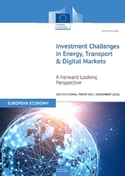
|
|
More News
|

|
|
Eurogroup welcomes draft budgetary plans and takes note of Commission's call for a positive fiscal stance
|
|
At a Eurogroup meeting on 5 December, euro area finance ministers welcomed that 18 Member States had submitted Draft Budgetary Plans (DBPs) for 2017 on time. The Commission had previously provided in-depth individual assessments and opinions on the DBPs, together with an analysis of the budgetary situation in the euro area as a whole. The ministers broadly concurred with the Commission's analysis and opinions. The Eurogroup also took note of the Commission Communication and analysis that called for a positive fiscal stance and underlined the importance of an appropriate balance between sustainability and investment to strengthen the recovery. In other news, the Eurogroup also welcomed the progress that has been made in reaching full staff-level agreement between Greece and the institutions in the context of the second review of the ESM programme.
|
|
|
|

|
|
Investment Plan: Council agrees its stance to extend EFSI lifespan and financial capacity
|
|
On 6 December 2016, the Council agreed on its stance for negotiations with the European Parliament regarding the Commission proposal to extend the lifespan of the European Fund for Strategic Investments (EFSI), a key part of the Investment Plan. On the basis of the Commission proposal, the agreed stance involves extending the lifespan of the EFSI until 2020; increasing its financial target to at least EUR 500 billion; increasing the EU budget guarantee to EUR 26 billion; and increasing the European Investment Bank's contribution to EUR 7.5 billion (from EUR 5 billion currently). The Council also agreed on the introduction of a number of operational improvements to take account of lessons learned from the first year of EFSI implementation. Investment conditions have improved in the EU since the Investment Plan was launched. Economic confidence is returning and according to three evaluations the plan is already delivering results. Established in mid-2015, the EFSI is on track to attain its EUR 315 billion target in additional investments by mid-2018.
|
|
|
|

|
|
Ireland post-programme surveillance mission: economic prospects remain bright, but some clouds are on the horizon
|
|
Staff from the European Commission, in liaison with staff from the European Central Bank, visited Dublin from 29 November-2 December to conduct the sixth post-programme surveillance review for Ireland. This was coordinated with the International Monetary Fund's sixth post-programme monitoring mission. Staff from the European Stability Mechanism also participated in the meetings on aspects related to its Early Warning System. While GDP is expected to continue to grow at robust rates, the future evolution of the activities of multinational enterprises remains uncertain and the external environment has become increasingly unpredictable, especially after the UK 'leave' vote. Ireland's fiscal adjustment has been remarkable but slowed in 2016. Meanwhile, increased external uncertainty puts an even greater premium on prudent fiscal policy and a reorientation of public spending toward investment. Moreover, despite significant progress in recent years, there is ample scope for further vigilance in the banking sector.
|
|
|
|

|
|
Portuguese post-programme surveillance: economic recovery continues but country needs to increase growth potential
|
|
Staff from the European Commission and from the European Central Bank visited Portugal from 29 November to 7 December to conduct the fifth post-programme surveillance (PPS) mission. This visit also served as specific monitoring by the Commission in the framework of the EU Macroeconomic Imbalance Procedure. Despite some positive developments, Portugal’s moderate economic recovery – which has continued since the end of the adjustment programme in June 2014 – is being held back by elevated levels of debt in the private and public sector, high non-performing loans and rigidities in product and labour markets. Overall, the mission noted the need for a sustainable improvement of growth conditions that would imply a consolidation strategy, a comprehensive approach to reduce corporate debt and weaknesses in the financial sector, as well as a clear plan to boost potential growth and competitiveness. The latter would require further measures to increase skill levels in the economy and to tackle rigidities in product markets.
|
|
|
|

|
|
Investment Plan: European Investment Project Portal promoting investment in high value-added sectors
|
|
The European Investment Project Portal (EIPP, the Portal), an important component of the Investment Plan for Europe, already features some 140 investment opportunities across the EU. The Portal serves not only the EU project promoters to boost the visibility of their projects, but also investors from all over the world, by providing a transparent forward looking pipeline of projects. The EIPP promotes investment in high value-added sectors such as R&D and Digital, Energy, Transport, Social Infrastructure, Resources & Environment, and SMEs. Many of the projects on the Portal are cross-border ones, resulting in some 200 project-marks on the interactive EIPP project map. To make the Portal more attractive for the promoters, the minimum permissible project size was recently lowered to EUR 5 million. In addition, publicly supported projects (incl. by central and regional governments) are now exempt from the project submission fee.
|
|
|
|

|
|
ECFIN Annual Research Conference explores challenges to economic integration at the global and European levels
|
|
DG ECFIN's Annual Research Conference took place on 28 November in Brussels. The conference brought together leading figures from academia and economic policy-making circles, altogether forming an audience of about 80 invited participants. The conference was the flagship event of DG ECFIN's Fellowship Initiative 2016-2017. It’s theme was "Moving closer rather than drifting apart: Challenges to economic integration at the global and European level". Maurice Obstfeld, Chief Economist at the IMF, delivered the DG ECFIN Distinguished Lecture 2016, forcefully making the case for "Fiscal risk sharing and governance for the euro area: More important than ever". Prominent panellists discussed the current challenges to European economic integration, and dedicated sessions looked into: Diverging trends and perceptions of global and European integration; Economic policy strategies revisited; The labour market and social welfare compact in EMU; and Integrating financial markets, Banking Union and Capital Market Union.
|
|
|
|

|
|
ECB to continue then taper asset purchase programme
|
|
On 8 December, the European Central Bank (ECB) announced a continuation of the bank's asset purchase programme (APP), although a reduced pace of purchases is set to start from April next year. The current monthly pace of EUR 80 billion in net asset purchases will continue until the end of March 2017, and then be reduced to EUR 60 billion from April 2017, and continue at that pace until the end of December 2017, or beyond, if necessary. If, however, the outlook becomes less favourable or financial conditions become inconsistent with a sustained adjustment of the path of inflation, the ECB Governing Council intends to increase the programme in terms of size and/or duration. To ensure the continued smooth implementation of the Eurosystem’s asset purchases, the Governing Council also decided to change some of the parameters of the APP. The interest rate on the main refinancing operations and the interest rates on the marginal lending facility and the deposit facility will remain unchanged at 0.00%, 0.25% and -0.40% respectively. The Governing Council continues to expect the key ECB interest rates to remain at present or lower levels for an extended period of time, and well past the horizon of the net asset purchases.
|
|
|
|

|
|
Creating a stronger financial system: New EU rules for the recovery and resolution of Central Counterparties
|
|
The European Commission proposed new rules on 28 November that would ensure that systemic market infrastructures in the financial system, known as Central Counterparties (CCPs), can be recovered or resolved in an orderly manner when things go wrong. CCPs act as intermediaries to both sides of a transaction for financial instruments, including bonds, equities, derivatives and commodities (such as agricultural products, oil and natural gas). They help financial firms and end users such as corporates manage their business risks and are critical in helping to reduce risks and interconnections throughout the financial system. The scale and importance of CCPs in Europe and globally has nearly doubled since the post-crisis G20 commitment to clear standardised over-the-counter (OTC) derivatives through CCPs. In fact, a large proportion of the EUR 500 trillion in derivatives contracts outstanding globally are cleared by 17 CCPs across Europe.
|
|
|
|
|
|
 |
|














